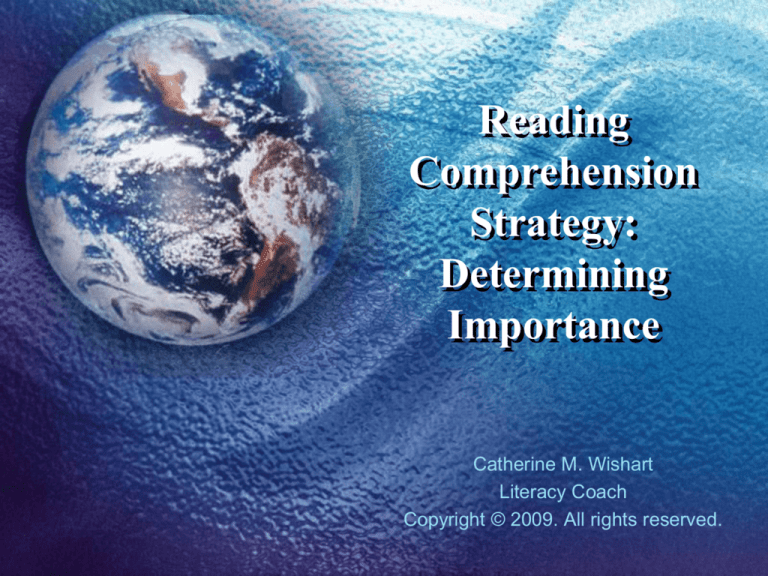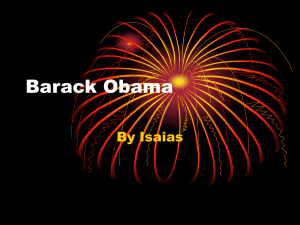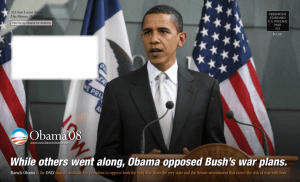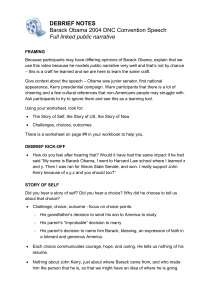
Reading
Comprehension
Strategy:
Determining
Importance
Catherine M. Wishart
Literacy Coach
Copyright © 2009. All rights reserved.
“The essence of living is
discovering. Indeed, it is
the joy of discovery that
makes life worth the
effort.”
- Vijay Krishna
Reading Comprehension Strategies
Fix-up
Strategies
Synthesize
Information
Make
Mental
Images
Reading
Comprehension
Determine
Importance
Make
Inferences
Ask
Questions
Build
Background
Knowledge
How Do Readers Determine
Importance?
• “Titles, bold headings, pictures with captions, quotations,
timelines, graphs, and maps give valuable information
about what’s important.” (Zimmermann and Hutchins, 2003, p. 128).
• Readers must determine their own purpose for reading
an article in order to decide what is important.
– If you are reading an article about losing weight in order to follow
the author’s suggestions, you will note each step the author tells
you to take.
– If you are reading the same article about losing weight in order to
write a research paper on why diets don’t work, you will pay
attention to the errors in the author’s suggestions.
• Readers need to determine the overall message of the
author in order to decide what supportive statements are
important and which statements are superfluous.
Determining Importance:
Barack Obama Biography
Barack Hussein Obama was born Aug. 4, 1961, in Honolulu, Hawaii. His father, Barack
Obama, Sr., was born of Luo ethnicity in Nyanza Province, Kenya. He grew up herding goats with
his own father, who was a domestic servant to the British. Although reared among Muslims,
Obama, Sr., became an atheist at some point.
Obama’s mother, Ann Dunham, grew up in Wichita, Kansas. Her father worked on oil rigs
during the Depression. After the Japanese attack on Pearl Harbor, he signed up for service in World
War II and marched across Europe in Patton’s army. Dunham’s mother went to work on a bomber
assembly line. After the war, they studied on the G.I. Bill, bought a house through the Federal
Housing Program, and moved to Hawaii.
Meantime, Barack’s father had won a scholarship that allowed him to leave Kenya pursue
his dreams in Hawaii. At the time of his birth, Obama’s parents were students at the East-West
Center of the University of Hawaii at Manoa.
Obama’s parents separated when he was two years old and later divorced. Obama’s
father went to Harvard to purse Ph.D. studies and then returned to Kenya.
Four years later when Barack (commonly known throughout his early years as “Barry”)
was ten, he returned to Hawaii to live with his maternal grandparents, Madelyn and Stanley
Dunham, and later his mother (who died of ovarian cancer in 1995).
In his memoir, Obama described how he struggled to reconcile social perceptions of his
multiracial heritage. He saw his biological father (who died in a 1982 car accident) only once (in
1971) after his parents divorced. And he admitted using alcohol, marijuana, and cocaine during his
teenage years.
(Bio. “True Story.” http://www.biography.com/featured-biography/barack-obama/index.jsp).
Internal Questions to Help
Determine Importance
• What is my purpose for reading this piece?
• What has the author done to signal what is
important to remember?
• As I read this passage, what is the most
important point here that is essential for
me to remember?
• How does generating questions help me
sort through all this information to pull out
what is important?
•
(Zimmermann and Hutchins, 2003, pp. 142-143).
Finding Important Information
• My purpose is to learn more about Obama.
– His mother and father were raised in exceptionally different cultures.
– His grandparents valued education (G.I. Bill).
• The author has pointed out the differences between his
parents’ cultures with words like “meantime.”
• Important to remember are Obama’s reflections in his
memoirs because these statements reveal what Obama
thinks about himself.
• Questions I ask myself when I read this include:
–
–
–
–
How did it feel to be abandoned by his father?
What kind of influence did his step-father have on his life?
Where was his mother at first when he went to live in Hawaii?
How does Obama reconcile his experimentation with drugs when he
was younger?
Practicing This Strategy
• The short story, “The Puzzle,” is continued
on the next slide.
• Read this portion of the story carefully.
You may also decide to review previous
portions of the story to assure you recall
the highlights of the characters and the
plot.
“The Puzzle” by Anonymous
Pugh had left his puzzle box behind him. We had done all we could, together, to solve the puzzle. He
had left it behind to see what I could do with it alone. So much had it engrossed my attention that I had even
brought it into my bedroom, in order that I might, before retiring to rest, make a final attempt at the solution of the
mystery. NOW what possessed the thing?
As I stood, and looked, and listened, one thing began to be clear to me, that some sort of machinery
had been set in motion inside the box. How it had been set in motion was another matter. But the box had been
subjected to so much handling, to such pressing and such hammering, that it was not strange if, after all, Pugh or
I unconsciously hit upon the spring which set the whole thing going. Possibly the mechanism had got so rusty that
it had refused to act at once. It had hung fire, and only after some hours had something or other set the
imprisoned motive power free.
But what about the screeching? Could there be some living creature concealed within the box? Was I
listening to the cries of some small animal in agony? Momentary reflection suggested that the explanation
prevented the mechanism from acting at once was causing the screeching now. The uncanny sounds were
caused by nothing more or less than the want of a drop or two of oil. Such an explanation would not have
satisfied Pugh, it satisfied me.
Picking up the box, I placed it to my ear.
“I wonder how long this little performance is going to continue. And what is going to happen when it is
good enough to cease? I hope” – an uncomfortable thought occurred to me – “I hope Pugh hasn’t’ picked up
some pleasant little novelty in the way of an infernal machine. It would be a first-rate joke if he and I had been
endeavoring to solve the puzzle of how to set it going.”
I don’t mind owning that as this reflection crossed my mind I replaced Pugh’s puzzle on the dressingtable. The idea did not commend itself to me at all. The box evidently contained some curious mechanism. It
might be more curious than comfortable. Possibly some agreeable little device in clockwork. The tick, tick, tick
suggested clockwork which had been planned to go a certain time, and then - then, for all I knew, ignite an
explosive, and – blow up. It would be a charming solution to the puzzle if it were to explode while I stood there, in
my nightshirt, looking on. It is true that the box weighed very little. Probably, as I have said, the whole affair would
not have turned the scale at a couple of ounces. But then its very lightness might have been part of the ingenious
inventor’s little game. There are explosives with which one can work a very satisfactory amount of damage with
considerably less than a couple of ounces.
While I was hesitating – I own it! – whether I had not better immerse Pugh’s puzzle in a can of water, or throw
it out of the window, or call down Bob with a request to at once remove it to his apartment, both the tick, tick,
tick and the screeching ceased, and all within the box was still. If it WAS going to explode, it was now or
never. Instinctively, I moved in the direction of the door.
I waited with a certain sense of anxiety. I waited in vain. Nothing happened, not even a renewal of
the sound.
“I wish Pugh had kept his precious puzzle at home. This sort of thing tries one’s nerves.”
When I thought that I perceived that nothing seemed likely to happen, I returned to the
neighborhood of the table. I looked at the box askance. I took it up gingerly. Something might go off at any
moment for all I knew. It would be too much of a joke if Pugh’s precious puzzle exploded in my hand, I shook it
doubtfully; nothing rattled. I held it to my ear. There was not a sound. What had taken place? Had the
clockwork run down, and was the machine arranged with such a diabolical ingenuity that a certain interval was
required, after the clockwork had run down, before an explosion could occur? Or had rust caused the
mechanism to again hang fire?
“After making all that commotion the thing might at least come open.” I banged the box viciously
against the corner of the table. I felt that I would almost rather that an explosion should take place than that
nothing should occur. One does not care to be disturbed from one’s sound slumber in the small hours of the
morning for a trifle.
“I’ve half a mind to get a hammer, and try, as they say in the cookery books, another way.”
Unfortunately I had promised Pugh to abstain from using force. I might have shivered the box open
with my hammer, and then explained that it had fallen, or got trod upon, or sat upon, or something, and so got
shattered, only I was afraid that Pugh would not believe me. The man is himself such an untruthful man that
he is in a chronic state of suspicion about the truthfulness of others.
“Well, if you’re not going to blow up, or open, or something, I’ll say good night.”
I gave the box a final rap with my knuckles and a final shake, replaced it on the table, put out the
gas, and returned to bed.
I was just sinking again into slumber, when that box began again. It was true that Pugh had
purchased the puzzle, but it was evident that the whole enjoyment of the purchase was destined to be mine. It
was useless to think of sleep while that performance was going on. I sat up in bed once more.
What Do You Determine as
Important?
• In this portion of the text, what is the author’s
purpose? What is the author trying to do?
• What questions do you ask yourself that help
you determine what is most important?
• What prediction can you make about what will
likely happen next?
• Complete the double-entry journal page on this
portion of the story and be prepared to discuss
the story in class.
When Determining Importance,
Remember These Tips
• Determining importance has to do with knowing why you’re reading
and then make decisions about what information or ideas are most
critical to understanding the overall meaning of the piece.
• Knowing your purpose for reading is a big factor in determining
what’s important when you read. It affects how carefully you read
and has an impact on what you determine to be important.
• To determine importance, you consciously prioritize information to
make decisions about what’s essential and what is less essential.
• Reading to add background knowledge directs your search for
important information.
• Launching a search to determine important information often starts
with the generation of a question.
• Authors leave clues as to what they think is important to
remember. Phrases like “as a result” and “in summary” alert you to
watch for essential information.
(Zimmermann and Hutchins, 2003, p. 139).
As you read, stop now and
then to consider what it’s
important to remember.
Distinguish between facts
that are interesting and
those that are important.
(Zimmermann and Hutchins, 2003, p. 135).
References
• Anonymous. “The Puzzle.” http://www.classicreader.com/book/1409/1.
• Bio. “True Story: Barack Obama.” http://www.biography.com/featuredbiography/barack-obama/index.jsp.
• Krishna, Vijay.
http://www.quoteland.com/topic.asp?CATEGORY_ID=47.
• Zimmerman, Susan, and Hutchins, Chryse. 7 Keys to Comprehension.
NY: Three Rivers Press, 2003.






